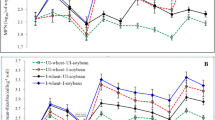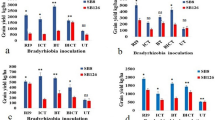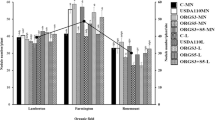Abstract
The effects of sole inoculation of soybean (Glycine max L. Merrill) with Bradyrhizobium and co-inoculation with Bradyrhizobium and Azospirillum on nodulation, plant growth and yields were investigated in the 2013/2014 and 2014/2015 cropping seasons under field conditions in Mozambique. The treatments included (1) Control (non-inoculated control, with symbiosis depending on indigenous rhizobia), (2) Urea (non-inoculated, receiving 200 kg ha−1 of N), (3) Sole inoculation with B. diazoefficiens strain USDA 110, and (4) Co-inoculation with B. diazoefficiens strain USDA 110 and A. brasilense strains Ab-V5 and Ab-V6, evaluated in a randomized complete block design with five replications. Nodule number and dry weight, shoot dry weight, biological and grain yields, grain dry weight, and harvest index were evaluated. In general, both sole inoculation and co-inoculation enhanced nodulation in relation to control. Sole inoculation increased grain yield by 22% (356 kg ha−1), the same enhancement magnitude attained under mineral N treatment, suggesting that Bradyrhizobium inoculation provides ecological and economic sustainability to the soybean crop in Mozambique or other countries with similar agro-climatic conditions. Co-inoculation did not increase grain yields in relation to neither the control nor sole inoculation, indicating that further research with adapted and high yielding soybean varieties along with effective rhizobial strains is required in Mozambique to attune the beneficial Azospirillum–plant cultivar–rhizobia interactions that have been reported in other countries for several legumes, including soybean.


Similar content being viewed by others
References
Abaidoo RC, Keyser HH, Singleton PW, Dashiell KE, Sanginga N (2007) Population size, distribution, and symbiotic characteristics of indigenous Bradyrhizobium spp. that nodulate TGx soybean genotypes in Africa. Appl Soil Ecol 35(1):57–67. https://doi.org/10.1016/j.apsoil.2006.05.006
Ahern C, Baker D, Aitken R (1995) Models for relating pH measurements in water and calcium chloride for a wide range of pH, soil types and depths. Plant Soil 171(1):47–52. https://doi.org/10.1007/BF00009563
Aung TT, Tittabutr P, Boonkerd N, Herridge D, Teaumroong N (2013) Co-inoculation effects of Bradyrhizobium japonicum and Azospirillum sp. on competitive nodulation and rhizosphere eubacterial community structures of soybean under rhizobia-established soil conditions. Afr J Biotechnol 12(20):2850–2862. https://doi.org/10.5897/AJB12.2557
Bashan Y, de-Bashan LE (2010) How the plant growth-promoting bacterium Azospirillum promotes plant growth—a critical assessment. In: Sparks DL (ed) Advances in agronomy. Elsevier, New York, pp 77–136. https://doi.org/10.1016/S0065-2113(10)08002-8
Braccini AL, Mariucci GEG, Suzukawa AK, da Silva Lima LH, Piccinin GG (2016) Co-inoculação e modos de aplicação de Bradyrhizobium japonicum e Azospirillum brasilense e adubação nitrogenada na nodulação das plantas e rendimento da cultura da soja. Sci Agrar Paran 15(1):27–35
Cassán F, Coniglio A, López G, Molina R, Nievas S, de Carlan CLN, Donadio F, Torres D, Rosas S, Pedrosa FO (2020) Everything you must know about Azospirillum and its impact on agriculture and beyond. Biol Fertil Soils. https://doi.org/10.1007/s00374-020-01463-y
Cassán F, Diaz-Zorita M (2016) Azospirillum sp. in current agriculture: from the laboratory to the field. Soil Biol Biochem 103:117–130. https://doi.org/10.1016/j.soilbio.2016.08.020
Chibeba AM, Guimarães MdF, Brito OR, Nogueira MA, Araujo RS, Hungria M (2015) Co-inoculation of soybean with Bradyrhizobium and Azospirillum promotes early nodulation. Am J Plant Sci 6:1641–1649. https://doi.org/10.4236/ajps.2015.610164
Chibeba AM, Kyei-Boahen S, Guimarães MF, Nogueira MA, Hungria M (2017) Isolation, characterization and selection of indigenous Bradyrhizobium strains with outstanding symbiotic performance to increase soybean yields in Mozambique. Agric Ecosyst Environ 246:291–305. https://doi.org/10.1016/j.agee.2017.06.017
Chibeba AM, Kyei-Boahen S, Guimarães MF, Nogueira MA, Hungria M (2018) Feasibility of transference of inoculation-related technologies: a case study of evaluation of soybean rhizobial strains under the agro-climatic conditions of Brazil and Mozambique. Agric Ecosyst Environ 261:230–240. https://doi.org/10.1016/j.agee.2017.06.037
Cleland J (2013) World population growth; past, present and future. Environ Resour Econ 55(4):543–554. https://doi.org/10.1007/s10640-013-9675-6
de Carvalho RH, Jesus EdC, Favero VO, Straliotto R, Araújo AP (2020) The co-inoculation of rhizobium and Bradyrhizobium increases the early nodulation and development of common beans. J Soil Sci Plant Nutr. https://doi.org/10.1007/s42729-020-00171-8
Dobbelaere S, Croonenborghs A, Thys A, Ptacek D, Vanderleyden J, Dutto P, Labandera-Gonzalez C, Caballero-Mellado J, Aguirre JF, Kapulnik Y (2001) Responses of agronomically important crops to inoculation with Azospirillum. Funct Plant Biol 28(9):871–879. https://doi.org/10.1071/PP01074
Fehr WR, Caviness CE (1977) Stages of soybean development. Iowa State University of Science and Technology Ames, Iowa., p 12
Ferri GC, Braccini AL, Anghinoni FBG, Pereira LC (2017) Effects of associated co-inoculation of Bradyrhizobium japonicum with Azospirillum brasilense on soybean yield and growth. Afr J Agric Res 12(1):6–11. https://doi.org/10.5897/AJAR2016.11711
Gerland P, Raftery AE, Ševčíková H, Li N, Gu D, Spoorenberg T, Alkema L, Fosdick BK, Chunn J, Lalic N (2014) World population stabilization unlikely this century. Science 346(6206):234–237. https://doi.org/10.1126/science.1257469
Giller KE (2001) Nitrogen fixation in tropical cropping systems. CABI Publishing, Wallingford, p 423. https://doi.org/10.1079/9780851994178.0000
Giller KE, Murwira MS, Dhliwayo DK, Mafongoya PL, Mpepereki S (2011) Soyabeans and sustainable agriculture in southern Africa. Int J Agric Sustain 9(1):50–58. https://doi.org/10.3763/ijas.2010.0548
Gyogluu C, Boahen SK, Dakora FD (2016) Response of promiscuous-nodulating soybean (Glycine max L. Merr.) genotypes to Bradyrhizobium inoculation at three field sites in Mozambique. Symbiosis 66(3):1–11. https://doi.org/10.1007/s13199-015-0376-5
Hungria M, Nogueira MA, Araujo RS (2013) Co-inoculation of soybeans and common beans with rhizobia and azospirilla: strategies to improve sustainability. Biol Fertil Soils 49(7):791–801. https://doi.org/10.1007/s00374-012-0771-5
Hungria M, Nogueira MA, Araujo RS (2015) Soybean seed co-inoculation with Bradyrhizobium spp. and Azospirillum brasilense: a new biotechnological tool to improve yield and sustainability. Am J Plant Sci 6:811–817. https://doi.org/10.4236/ajps.2015.66087
Kilmer VJ, Alexander LT (1949) Methods of making mechanical analysis of soils. Soil Sci 68:15–24
Klogo P, Ofori JK, Amaglo H (2015) Soybean (Glycine max (L) Merill) promiscuity reaction to indigenous Bradyrhizobia inoculation in some Ghanaian soils. Int J Sci Technol Res 4(11):306–313. https://doi.org/10.1016/j.apsoil.2005.06.008
Kusunoki M, Sato D, Tsutsumi K, Tsutsui H, Nakamura T, Oshida Y (2015) Black soybean extract improves lipid profiles in fenofibrate-treated Type 2 Diabetics with postprandial hyperlipidemia. J Med Food 0:1–4
Li YH, Li W, Zhang C, Yang L, Chang RZ, Gaut BS, Qiu LJ (2010) Genetic diversity in domesticated soybean (Glycine max) and its wild progenitor (Glycine soja) for simple sequence repeat and single-nucleotide polymorphism loci. New Phytol 188(1):242–253. https://doi.org/10.1111/j.1469-8137.2010.03344.x
MASA (2015) Anuário de Estatísticas Agrárias 2015. Ministério da Agricultura e Segurança Alimentar, Maputo, p 66
Nabintu NB, Ndemo OR, Sharwasi NL, Gustave MN, Esther MR, Okoth KS (2019) Indigenous rhizobia strains: the silver bullet for enhanced biological nitrogen fixation and soybean (Glycine max (L.) Merr.) yield under different soil conditions in South Kivu province, Democratic Republic of Congo. Afr J Agric Res 14(35):2038–2047. https://doi.org/10.5897/AJAR2019.14457
O’Hara GW, Hungria M, Woomer P, Howieson JG (2016) Counting rhizobia. In: Howieson JG, Dilworth MJ (Eds.), Working with rhizobia, Australian Centre for International Agricultural Research, Canberra, pp. 108–124. ISSN: 1447-090X
Osunde A, Gwam S, Bala A, Sanginga N, Okogun J (2003) Responses to rhizobial inoculation by two promiscuous soybean cultivars in soils of the Southern Guinea savanna zone of Nigeria. Biol Fertil Soils 37(5):274–279. https://doi.org/10.1007/s00374-003-0611-8
Pulver EL, Kueneman EA, Ranga-Rao V (1985) Identification of promiscuous nodulating soybean efficient in N2 fixation. Crop Sci 25:660–663. https://doi.org/10.2135/cropsci1985.0011183X002500040019x
Remans R, Ramaekers L, Schelkens S, Hernandez G, Garcia A, Reyes JL, Mendez N, Toscano V, Mulling M, Galvez L (2008) Effect of Rhizobium-Azospirillum coinoculation on nitrogen fixation and yield of two contrasting Phaseolus vulgaris L. genotypes cultivated across different environments in Cuba. Plant Soil 312:25–37. https://doi.org/10.1007/s11104-008-9606-4
Sakschewski B, von Bloh W, Huber V, Müller C, Bondeau A (2014) Feeding 10 billion people under climate change: how large is the production gap of current agricultural systems? Ecol Modell 288:103–111. https://doi.org/10.1016/j.ecolmodel.2014.05.019
Sims J (1989) Comparison of mehlich 1 and mehlich 3 extractants for P, K, Ca, Mg, Mn, Cu and Zn in Atlantic coastal plain soils. Commun Soil Sci Plant Anal 20(17–18):1707–1726. https://doi.org/10.1080/00103628909368178
Smart T, Hanlon J (2014) Chicken and beer: a recipe for agricultural growth in Mozambique. Kapicua, Maputo, p 93
Streeter JG (1994) Failure of inoculant rhizobia to overcome the dominance of indigenous strains for nodule formation. Can J Microbiol 40(7):513–522. https://doi.org/10.1139/m94-084
Tefera H (2011) Breeding for promiscuous soybeans at IITA. In: Sudaric A (ed) Soybean—molecular aspects of breeding. InTech, London, pp 147–163. https://doi.org/10.5772/14533
Ulzen J, Abaidoo RC, Masso C, Owusu-Ansah EDJ, Ewusi-Mensah N (2018) Is there a need for Bradyrhizobium yuanmingense and B. japonicum reinoculation in subsequent cropping seasons under smallholder farmers’ conditions? Appl Soil Ecol 128:54–60. https://doi.org/10.1016/j.apsoil.2018.04.003
van Heerwaarden J, Baijukya F, Kyei-Boahen S, Adjei-Nsiah S, Ebanyat P, Kamai N, Wolde-Meskel E, Kanampiu F, Vanlauwe B, Giller K (2018) Soyabean response to rhizobium inoculation across sub-Saharan Africa: patterns of variation and the role of promiscuity. Agric Ecosyst Environ 261:211–218. https://doi.org/10.1016/j.agee.2017.08.016
Vicario JC, Primo ED, Dardanelli MS, Giordano W (2016) Promotion of peanut growth by co-inoculation with selected strains of Bradyrhizobium and Azospirillum. J Plant Growth Regul 35(2):413–419. https://doi.org/10.1007/s00344-015-9547-0
Vlassak KM, Vanderleyden J, Graham P (1997) Factors influencing nodule occupancy by inoculant rhizobia. Crit Rev Plant Sci 16(2):163–229. https://doi.org/10.1080/07352689709701948
Walkley A, Black IA (1934) An examination of the Degtjareff method for determining soil organic matter, and a proposed modification of the chromic acid titration method. Soil Sci 37(1):29–38
Youseif SH, El-Megeed FHA, Khalifa MA, Saleh SA (2014) Symbiotic effectiveness of Rhizobium (Agrobacterium) compared to Ensifer (Sinorhizobium) and Bradyrhizobium genera for soybean inoculation under field conditions. Res J Microbiol 9(3):151–162. https://doi.org/10.3923/jm.2014.151.162
Zanetta CU, Waluyo B, Rachmadi M, Karuniawan A (2015) Oil content and potential region for cultivation black soybean in Java as biofuel alternative. Energy Procedia 65:29–35. https://doi.org/10.1016/j.egypro.2015.01.025
Acknowledgements
Amaral M. Chibeba acknowledges being awarded PhD fellowship from Wageningen University through the N2Africa Project and is enormously grateful to the staff at the International Institute of Tropical Agriculture (IITA) in Mozambique for their crucial support in the conduction of the field experiments. M.F. Guimarães, M.A. Nogueira and M. Hungria are research fellows from CNPq.
Funding
This study was funded by the Bill and Melinda Gates Foundation (BMGF) through the N2Africa Project, under which Chibeba AM was awarded PhD fellowship.
Author information
Authors and Affiliations
Corresponding author
Ethics declarations
Conflict of interest
Guimarães MF, Nogueira MA and Hungria M belong to the INCT-Plant-Growth Promoting Microorganisms for Agricultural Sustainability and Environmental Responsibility (465133/2014-2). The authors declare that they have no conflict of interest.
Additional information
Communicated by Erko Stackebrandt.
Publisher's Note
Springer Nature remains neutral with regard to jurisdictional claims in published maps and institutional affiliations.
Electronic supplementary material
Below is the link to the electronic supplementary material.
Rights and permissions
About this article
Cite this article
Chibeba, A.M., Kyei-Boahen, S., de Fátima Guimarães, M. et al. Towards sustainable yield improvement: field inoculation of soybean with Bradyrhizobium and co-inoculation with Azospirillum in Mozambique. Arch Microbiol 202, 2579–2590 (2020). https://doi.org/10.1007/s00203-020-01976-y
Received:
Revised:
Accepted:
Published:
Issue Date:
DOI: https://doi.org/10.1007/s00203-020-01976-y




